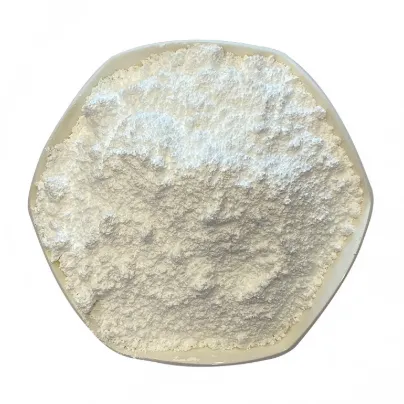
- +86-13363869198
- weimiaohb@126.com

Jun . 24, 2025 11:39 Nazaj na seznam
Reaction Intermediate in Organic Chemistry Plays a Crucial Role in Organic Chemistry
Reaction Intermediate in Organic Chemistry plays a crucial role in organic chemistry. They are molecular entities that briefly exist in the process of chemical reactions from reactants to products. Although reactants and products are usually relatively stable species, Reaction Intermediate in Organic Chemistry typically has high reactivity and short lifetimes, making them difficult to isolate and characterize directly. Nevertheless, research on Reaction Intermediate in Organic Chemistry is crucial for understanding reaction mechanisms and aiding in the development of new synthetic methods.

There are various types of Reaction Intermediates in Organic Chemistry, including carbocations, carboanions, free radicals, carbenes, and ketones
Each intermediate in organic chemistry has a unique electronic structure and reaction characteristics. For example, carbocation is a positively charged carbon atom, which is a strong electrophilic reagent due to its lack of electrons. On the contrary, carbon negative ions are negatively charged carbon atoms and are strong nucleophiles. Free radicals are atoms or molecules with unpaired electrons that typically react through a chain reaction. Carbene is a neutral molecule with two unpaired electrons that can participate in various reactions, including cycloaddition and insertion reactions. Ketones are compounds containing accumulated double bonds that can participate in reactions as electrophilic or nucleophilic reagents.
There are many methods for studying Reaction Intermediate in Organic Chemistry, including spectroscopy, kinetic studies, and computational chemistry
Spectral methods such as UV visible spectroscopy, infrared spectroscopy, and nuclear magnetic resonance spectroscopy can provide information about the structure and electronic properties of organic intermediates. Dynamics studies can determine the lifetime and reaction rate of intermediates. Computational chemistry methods can be used to predict the structure, energy, and reactivity of intermediates.
A deeper understanding of Reaction Intermediate in Organic Chemistry can help us better comprehend the mechanisms of organic reactions
The reaction mechanism is a series of steps that describe how reactants are transformed into products. By understanding the structure and reactivity of Reaction Intermediate in Organic Chemistry, we can predict the products of the reaction and design new reactions to synthesize specific compounds.
In short, Reaction Intermediate in Organic Chemistry is an indispensable part of organic chemistry. They are molecular entities that briefly exist during the reaction process, and understanding the reaction mechanism is crucial. By studying Reaction Intermediate in Organic Chemistry, we can better understand organic reactions and develop new synthetic methods.
Reaction Intermediate in Organic Chemistry FAQs
What is Reaction Intermediate in Organic Chemistry? What are their characteristics?
Reaction Intermediate in Organic Chemistry refers to highly reactive chemical species that briefly exist during chemical reactions. Their characteristics include:
Usually has a very short lifespan (milliseconds to seconds)
Has high reactivity
Difficult to separate and characterize directly
It is crucial in the study of reaction mechanisms
Decided the pathway and selectivity of the reaction
What are the main types of common Reaction Intermediates in Organic Chemistry?
The main types of Reaction Intermediate in Organic Chemistry include:
1) Carbocations
2) Carbon anions
3) Free radicals
4) Carbenes
5) Nitrene
6) Benzyne
7) Zwitterions (zwitterions)
8) Coordination intermediates (such as organometallic compounds)
How to detect and study these short-lived Reaction Intermediates in Organic Chemistry?
Modern chemistry uses various advanced technologies to study Reaction Intermediate in Organic Chemistry:
Low temperature matrix isolation technology
Time resolved spectroscopy (femtosecond laser technology)
In situ monitoring using nuclear magnetic resonance (NMR)
Real time detection by mass spectrometry (MS)
Computational Chemistry Simulation
Capture experiment (using specific reagents to capture intermediates)
Why is understanding Reaction Intermediate in Organic Chemistry so important for organic synthesis?
The importance of understanding Reaction Intermediate in Organic Chemistry is reflected in:
Assist in designing more efficient synthesis routes
Explain the selectivity and stereochemistry of reactions
Predicting and controlling side reactions
Develop new catalytic systems
Optimize reaction conditions (temperature, solvent, etc.)
Addressing issues in scaling up production
What are the latest developments and future directions in the research of Reaction Intermediate in Organic Chemistry?
The latest developments in this field include:
Application of Ultrafast Spectroscopy Technology (Femtosecond X-ray Diffraction)
Machine learning assisted intermediate prediction
New stabilization strategies (such as supramolecular encapsulation)
In depth study of photocatalytic intermediates
Intermediate regulation in electrochemical synthesis
Study on the Interaction of Enzyme Intermediates in Biocatalysis
-
CAS: 79099-07-3 Factories | GMP Stock, OEM, Fast Delivery
NoviceNov.17,2025
-
CAS: 79099-07-3 Factories | GMP Quality, Factory Prices
NoviceNov.17,2025
-
GS-441524 for White Liquid Type Factories | GMP OEM Bulk
NoviceNov.17,2025
-
CAS: 79099-07-3 Factories | GMP Bulk Supply, Fast Shipping
NoviceNov.17,2025
-
gs-441524 for white liquid type factories | GMP & fast ship
NoviceNov.17,2025
-
High-Purity cas 1451-83-8 factory | GMP Bulk, Fast Delivery
NoviceNov.17,2025